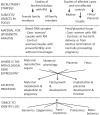Genetics of recurrent miscarriage: challenges, current knowledge, future directions
- PMID: 22457663
- PMCID: PMC3306920
- DOI: 10.3389/fgene.2012.00034
Genetics of recurrent miscarriage: challenges, current knowledge, future directions
Abstract
Recurrent miscarriage (RM) occurs in 1-3% of couples aiming at childbirth. Due to multifactorial etiology the clinical diagnosis of RM varies. The design of genetic/"omics" studies to identify genes and biological mechanisms involved in pathogenesis of RM has challenges as there are several options in defining the study subjects (female patient and/or couple with miscarriages, fetus/placenta) and controls. An ideal study would attempt a trio-design focusing on both partners as well as pregnancies of the couple. Application of genetic association studies focusing on pre-selected candidate genes with potential pathological effect in RM show limitations. Polymorphisms in ∼100 genes have been investigated and association with RM is often inconclusive or negative. Also, implication of prognostic molecular diagnostic tests in clinical practice exhibits uncertainties. Future directions in investigating biomolecular risk factors for RM rely on integrating alternative approaches (SNPs, copy number variations, gene/protein expression, epigenetic regulation) in studies of single genes as well as whole-genome analysis. This would be enhanced by collaborative network between research centers and RM clinics.
Keywords: association studies; epigenetics; genetics; omic’s studies; placenta; recurrent miscarriage; research and clinical collaboration; study design.
Figures

References
-
- Al-Khateeb G. M., Sater M. S., Finan R. R., Mustafa F. E., Al-Busaidi A. S., Al-Sulaiti M. A., Almawi W. Y. (2011). Analysis of interleukin-18 promoter polymorphisms and changes in interleukin-18 serum levels underscores the involvement of interleukin-18 in recurrent spontaneous miscarriage. Fertil. Steril. 96, 921–92610.1016/j.fertnstert.2011.06.079 - DOI - PubMed
Grants and funding
LinkOut - more resources
Full Text Sources

